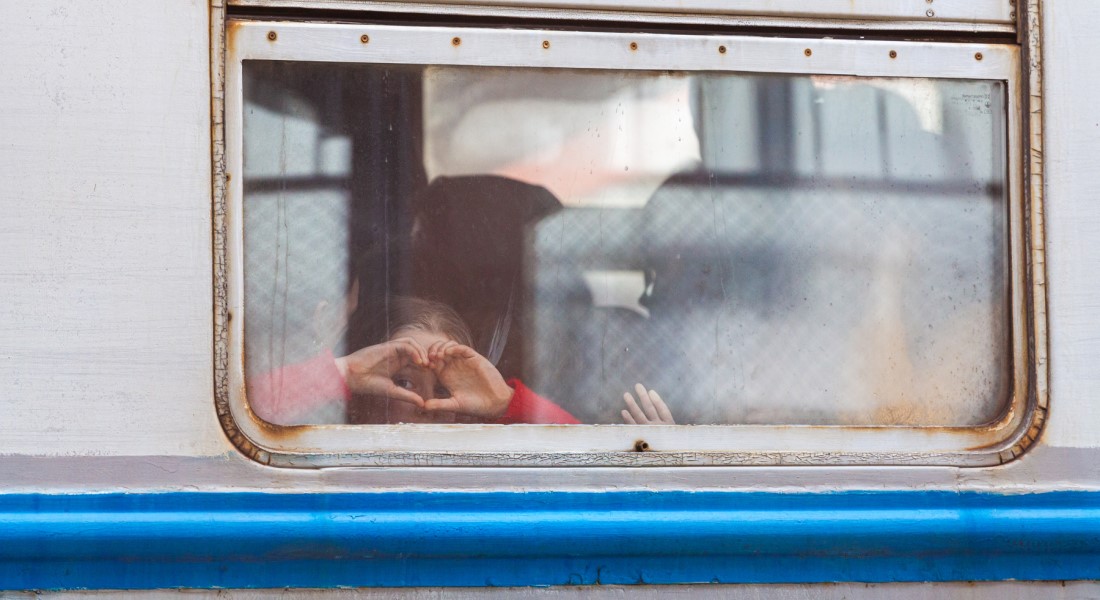Fewer Ukrainian refugees in Denmark show symptoms of post-traumatic stress
A new study of Ukrainian refugees in Denmark shows a significant drop in the proportion reporting signs of post-traumatic stress disorder (PTSD). But while more are thriving, many are also uncertain about the future, and no less than 60 per cent want to stay in Denmark permanently.

Two years after the Russian invasion, just over 41,000 Ukrainians have been granted residence in Denmark. Now, a new report by researchers at the Department of Psychology paints an updated picture of the well-being of Ukrainian refugees and the problems and concerns they experience on a daily basis.
The report, which is based on a questionnaire survey of adult Ukrainian refugees, follows up on a similar analysis from September 2023. In the report, the researchers conclude that resident Ukrainian refugees generally seem to be doing slightly better.
In particular, the new study shows that fewer refugees have symptoms of post-traumatic stress disorder, PTSD, or the more serious 'complex post-traumatic stress disorder', CPTSD. While 29.4 per cent of refugees previously experienced symptoms of PTSD or CPTSD, this is now reduced to 24.4 per cent.
"The study shows that as a whole, the group of Ukrainian refugees are generally doing well and actually even more so than when we first studied them. Fewer have symptoms of PTSD, fewer seem to be unhappy in Denmark and many want to stay," says Associate Professor Karen-Inge Karstoft from the Department of Psychology at UCPH.
She is leading the project 'DARECO - The Danish Refugee Cohort', which, with support from the Carlsberg Foundation and in collaboration with DIGNITY, is following almost 7,000 of the approximately 18,000 adult Ukrainians who were granted residence in Denmark from end of February 2022 and until about a year later. With the current second data collection, it is possible to study how the life and well-being of Ukrainians in Denmark develop over time.
Of the almost 7,000 people who took part in the first survey, just under 4,000 have taken part again, and the new report shows other significant trends:
No less than 60.4 per cent want to stay in Denmark even when the war is no longer a threat to their home town. In the first survey, the corresponding number was 49.5 per cent. At the same time, the refugees' already high level of trust in the Danish authorities has increased – albeit only by a small number. A full 93.9 per cent now say they have a high or very high level of trust in official Denmark.
A minority of people face major mental health challenges
However, the picture is not all positive. Although the proportion of refugees with symptoms of PTSD has fallen significantly, the proportion with symptoms of CPTSD is almost unchanged. 13.5 per cent compared to 12.6 per cent in the first survey.
There is a substantial group of Ukrainian refugees who have not recovered or have even gotten worse.
Both PTSD and CPTSD are reactions to traumatic experiences, such as war. However, in addition to low mental wellbeing, people with complex PTSD typically find it difficult to engage in human relationships and to manage their emotional reactions. Many also develop negative self-perceptions. The group therefore has significantly more social and well-being problems.
"Some of those who have symptoms of ordinary PTSD will get better when they settle in Denmark. Symptoms of CPTSD are more chronic and harder to treat, and it is worth considering if there should be more services to help this group. There is a substantial group of Ukrainian refugees who have not recovered or have even gotten worse," says Karen-Inge Karstoft.
The typical everyday problems
But even for the vast majority, life as a refugee is not without its challenges.
Since the first survey, the proportion of people experiencing different types of problems has generally fallen slightly, but worries about family in Ukraine remain a serious or major problem for many (see graph). This is not without reason. Some 44 per cent say they have lost family members or other close relatives as a result of the war.
Figure: Ukrainian refugees' three most significant problems in everyday life (per cent)
In addition, the fear of being sent home has increased since the last survey and is now perceived as a major or very major problem by about a third, compared to a quarter previously.
The Ukrainian refugees are in Denmark with a temporary residence permit until March 2025. This in itself can create uncertainty about the future. But concerns about the war in Ukraine and a stronger connection to Denmark can also increase the desire to stay in Denmark and the fear of repatriation, says Karen-Inge Karstoft.
"Some have been here for a long time and may have established a daily routine with work and a social network. This makes it easier to imagine staying here. That is the positive explanation. The negative is that as a refugee you look at the way the war is developing and you feel more hopeless about being able to return home. "
Download the report 'Displaced Ukrainians in Denmark II'
Meet the research group behind the survey
See and hear more about the DARECO project, which follows Ukrainian refugees in Denmark. The video is produced by Jes Brix Lauridsen, Brixter.
Contact
Karen-Inge Karstoft
Associate Professor, Department of Psychology
Email: kik@psy.ku.dk
Telephone: +45 35 33 50 50
Mobile: +45 61 67 16 19
Søren Bang
Journalist, Faculty of Social Sciences
Email: sba@samf.ku.dk
Mobile: +45 29 21 09 73
